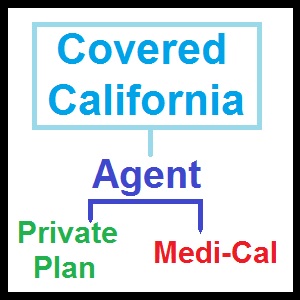What’s the difference between a Covered California enrollment for a subsidized private plan and Medi-Cal? Nothing when assisted by a Certified Insurance Agent. A Medi-Cal enrollment takes just as much knowledge, experience and time to perform for an agent as an enrollment for a private plan through Covered California. Yet, a Medi-Cal enrollment only yields a promised $58 compensation from Covered California for the Certified Insurance Agent.
Agents don’t make Medi-Cal determination
When an individual or family reaches out to an agent for assistance with enrollment the agent has no idea if the household may be eligible for a tax subsidized private plan, Medi-Cal, or if it will be a mixed household with the children in Medi-Cal and the parents in a private plan with tax credits. All of the household information must be entered into the CalHEERS program including immigration status, current health insurance offerings and family income. The Covered California software crunches all this information to make a determination of eligibility for either Medi-Cal, tax credits, or both.
Agents serve all clients regardless of income
Agents are there during the year to update the household information because of a loss of wages, adding a new job, new baby or a change of address. Any one of these changes can make the family eligible for tax credits or Medi-Cal. In addition to the basic application information, agents offer guidance on best health plan selection for the household based on the provider preferences and health plan benefits. This assistance extends in many instances with providing information on the different Medi-Cal managed care plans along with how Medi-Cal and Denti-Cal operate.
Medi-Cal enrollments should pay commissions to agents
When you look at all that an agent can assist a consumer with concerning Covered California, there is very little difference between whether the household is eligible for a private plan or Medi-Cal. Consequently, agents should be paid a commission on enrollments for adults and children into Medi-Cal plans. Understandably, the commission wouldnt be as large as the dwindling private plan commissions, but a maintenance fee needs to be considered for all the assistance agents provide. A year after the initial promise, Covered California is beginning to pay agents a one-time $58 fee per household when the family or individual is enrolled in Medi-Cal. This compensation doesn’t extend to children of mixed households and it is not guaranteed beyond when the grant money for the compensation is exhausted.
Agents are asked not to discriminate
Part of the long delay with the agent compensation for Medi-Cal was getting the funding and the legislation to allow Covered California to pay agents for Medi-Cal enrollments. Medicaid rules are specific that there can be no commissions paid for enrollment in the government funded health plans. Of course, this prohibition was before the ACA, the state exchanges, and Covered California’s agent agreement that we would service any consumer without prejudice or discrimination.
Large health plans enter Medi-Cal market for money
Many for profit and non-profit health insurance companies have gotten into the Medicaid health plan administration because of the guaranteed money. The ACA’s expanded Medicaid guide lines, where enrollment is based solely on income and not assets, means that thousands of young healthy adults are automatically enrolled in California’s Medi-Cal program. These young adults rarely use health care services. The fixed capitation amount paid for each enrollee to the Medi-Cal health plan means the monthly revenue for each young adult is greater than a similar private plan. The most expensive Platinum plan in the 95608 zip code, Region 3, for a 21 year old adult is $391 for an Anthem Blue Cross PPO plan. The average monthly reimbursement rate for the same 21 year old on Medi-Cal is $611 according to the Department of Health Care Services.
Early confusion on who to assist
Early in the 2014 open enrollment period many agents were under the mistaken belief that only Certified Enrollment Counselors could enroll households in to Medi-Cal. Undoubtedly, many families and individuals did not receive health insurance under the expanded Medicaid rules. Even now, the low compensation fee for Medi-Cal has many agents avoiding Medi-Cal eligible folks. Certified Insurance Agents, who accounted for nearly 40% of Covered California enrollments in 2014, represent an army of field staff ready to help all Californians receive health insurance.
Medicaid creates discrimination on low income households
If Covered California doesnt want agents to discriminate against households that potentially might be Medi-Cal, they need to work to increase the compensation for Medi-Cal enrollment. Agents are essentially asked to work for free when no viable compensation or commission arrangement is present. Certified Insurance Agents can be a great resource for reaching underserved communities and getting those families health care insurance. But Covered California and Medicaid guidelines create a de facto state of discrimination against households who arent making enough to qualify for a private plan and the commissions those plans pay to agents.


